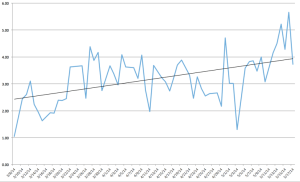How We Improved One Campaign’s ROAS by 162% in Four Steps
by Casey Walrath • May 29, 2014
Today I’m going to give a case study of how solid account organization and targeted testing helped us more than double the profits on one of our clients’ AdWords campaigns.
When we first took over the campaign it was delivering dozens of leads every day, and, luckily, we know our exact Return on Ad Spend, about $1.60 for every dollar spent.
Our problem? In order to cover operating costs and actually make a profit we needed by be somewhere around $3.00 per dollar spent. Clearly, we had work to do.
How We Went From 1.6 to 4.2x Return on Ad Spend
1. Better Account Organization
Most of our conversions came through a few dozen broad match keyword in AdWords. However, there’s a reason PPC experts advise against using regular broad match keywords: We were wasting a lot of money on searches that were completely irrelevant.
First we devised a plan to move away from our broad match keywords.
Every few days I checked the Search Query Report to see which searches had the most conversions. Then I selected the top ten or twenty and made a new ad group for each search query with just one keyword per ad group (with exact, phrase, and broad match modified variants).
Then we made sure the search query was added as a negative keyword for the broad match variant, which started pushing traffic away from broad match and into the more specific ad groups.
The result? After a few weeks instead of four ad groups with a dozen broad keywords we had dozens of ad groups with just one keyword each, and a unique ad for each keyword. Now we could start learning exactly which searches were most efficient, and we also started getting better quality scores and cheaper clicks—in fact, our cost per conversion dropped by about 40% in two months.
2. Better Landing Pages
Fortunately our client uses the landing page platform Unbounce, which allows us to A/B test multiple landing page variants easily, so we started testing new variants frequently.
Our initial landing page headline asked the question, Problems With Your Widget? We Can Fix It. That tended to deliver conversion rates in the 12% range. We tested that against a new variant with the more direct headline: We’ll Improve Your Widget Today. That delivered 15% conversion rates. Not bad, but how could we improve it?
We soon realized that people didn’t necessarily want a widget that worked better as much as they wanted the results a better widget would provided.
The widget was a means to improving productivity, but we were advertising features, not the benefit of productivity. So we tested a benefit-focused headline: We’ll Improve Your Productivity Today by Improving Your Widget.” This very quickly took conversion rates up to 20%. Much better!
3. Better Lead Segmentation
By improving our campaign structure and landing pages we were able to cut wasteful spend and starting bringing in even more leads for less cost. But we were still only at about 2.5x ROAS. So next we started focusing on where our leads were coming from to learn where we were actually making money.
In this case, we had PPC leads coming from two main sources: web leads via our desktop landing page form, and phone calls from our mobile landing page (which didn’t have a form).
Using our CRM we assigned phone and web leads different campaign IDs, and by segmenting mobile and desktop vs. mobile spend in AdWords we quickly learned that web leads were significantly more profitable than phone calls. In fact, by simply pausing mobile landing pages and bidding down mobile bids by 90% we raised our Return on Ad Spend to over 3x in just a few days.
4. Better Time of Day Segmenting
In our client’s industry, time is critical: a lead that isn’t closed in the first half-hour is unlikely to be closed at all. The client figured out approximately how many leads per hour each of the their salespeople needed to work efficiently, and we used the formula sales people X leads per hour X hours worked to determine our target number of leads per day and set our budget accordingly.
That worked okay, but we found more inefficiencies by breaking down conversions per hour in AdWords. We learned that too many leads came in the morning for the sales team to handle, while not enough came in the afternoon.
The morning shift was leaving leads untouched, and the afternoon shift had too many cold leads. Of course, the ideal solution would be to adjust the sales schedule to match lead volume, but there were logistical challenges such as limited office space.
Meanwhile, we developed a daily schedule of hourly bid adjustments to better manage the flow of leads based on how many people were actually working each hour.
This helped us to push our return on ad spend to over 4x, and even 5x on some days. At this point things start to get exciting. The client is happy that we reached and exceeded profitability, and has the funds and confidence to let us test new ideas. This is when PPC starts to get fun!
Future ideas to test might include: What ads are most effective? How else can we improve our landing page? How can we get mobile clicks profitable? Can we find out our ROAS on the keyword level? Is there anything totally off-the-wall we can test?
Hopefully this case study can give you some ideas you can test on your campaigns. Maybe you’ll come up with a few success stories of your own!






